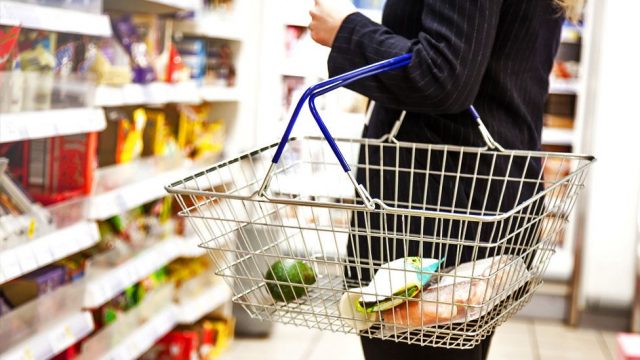Changes in behaviour come as price of staple foods rises by over 10% a year
37% – up 9 percentage points since March – have cut back on food spending
And 43% say they plan to do so ahead of winter, polling company Opinium found
Trade association British Retail Consortium says general shop inflation is 5.1%
Two in five householders have cut back on food spending and some are skipping meals amid surging prices, research shows.
The changes in behaviour come as the price of staple foods such as milk, meat and fresh produce rises by more than 10 per cent a year.
Some 37 per cent – up 9 percentage points since March – have cut back on food spending, polling company Opinium found. And 43 per cent say they plan to do so ahead of winter.
One in five (19 per cent) have taken the drastic step of skipping meals.

Some 37 per cent – up 9 percentage points since March – have cut back on food spending, polling company Opinium found. And 43 per cent say they plan to do so ahead of winter

Trade association the British Retail Consortium says general shop inflation stands at 5.1 per cent, which is the highest since it started collecting data in 2005. It put food price inflation at 9.3 per cent and fresh food at 10.5 per cent. A four-pint carton of milk is typically £1.45 – up by about 25 per cent since the start of this year
Rocio Concha, director of policy at consumer champion Which?, said: ‘Surging food prices will be concerning for households already grappling with a cost of living crisis in other areas.
‘People are responding in a range of ways, including in the most desperate cases having to miss meals, or resorting to food banks.’
At the same time, more than two-thirds of parents are worried about paying for food, energy and fuel and are being ‘pushed to the edge’, Nesta, the social good organisation, has found.
Parents say they feel ‘overwhelmed’, and as if they are a ‘let-down’ and a ‘failure’ because they cannot afford to cover essential bills.
Ravi Gurumurthy, Nesta’s chief executive, said: ‘Scarred by the past two years of Covid, lockdowns and school closures, parents are now anxious about the future and how they will feed their kids, pay their energy bills and mortgages, and afford childcare.’
Trade association the British Retail Consortium says general shop inflation stands at 5.1 per cent, which is the highest since it started collecting data in 2005. It put food price inflation at 9.3 per cent and fresh food at 10.5 per cent. Helen Dickinson, its chief executive, said: ‘Mounting cost pressures up and down supply chains meant shop price inflation hit a new high in August.
‘The war in Ukraine and consequent rise in the price of animal feed, fertiliser, wheat and vegetable oils continued to push up food prices.
‘Fresh food inflation, in particular, surged to its highest level since 2008 and products such as milk, margarine and crisps saw the biggest rises.’
A four-pint carton of milk is typically £1.45 – up by about 25 per cent since the start of this year.
A 500g tub of Lurpak rose more than 17 per cent to £4.21, a 500g pack of own-label spaghetti increased by 61 per cent to 85p and a pack of six Heinz Beanz cans shot up 36 per cent to £4.77. Miss Dickinson added: ‘The rise in shop prices is playing into wider UK inflation, which some analysts are predicting could top 18 per cent in 2023.
‘The situation is bleak for both consumers and retailers, but retail businesses will remain committed to supporting their customers through offering discounts to vulnerable groups, expanding value ranges, fixing prices of essentials and raising staff pay.’
Mike Watkins, from analyst NielsenIQ, said: ‘Inflation continues to accelerate and shoppers are already cautious about how much they spend on groceries, with a fall in volume sales at supermarkets in recent months.
‘We can expect this level of food inflation to be with us for at least another six months.’








